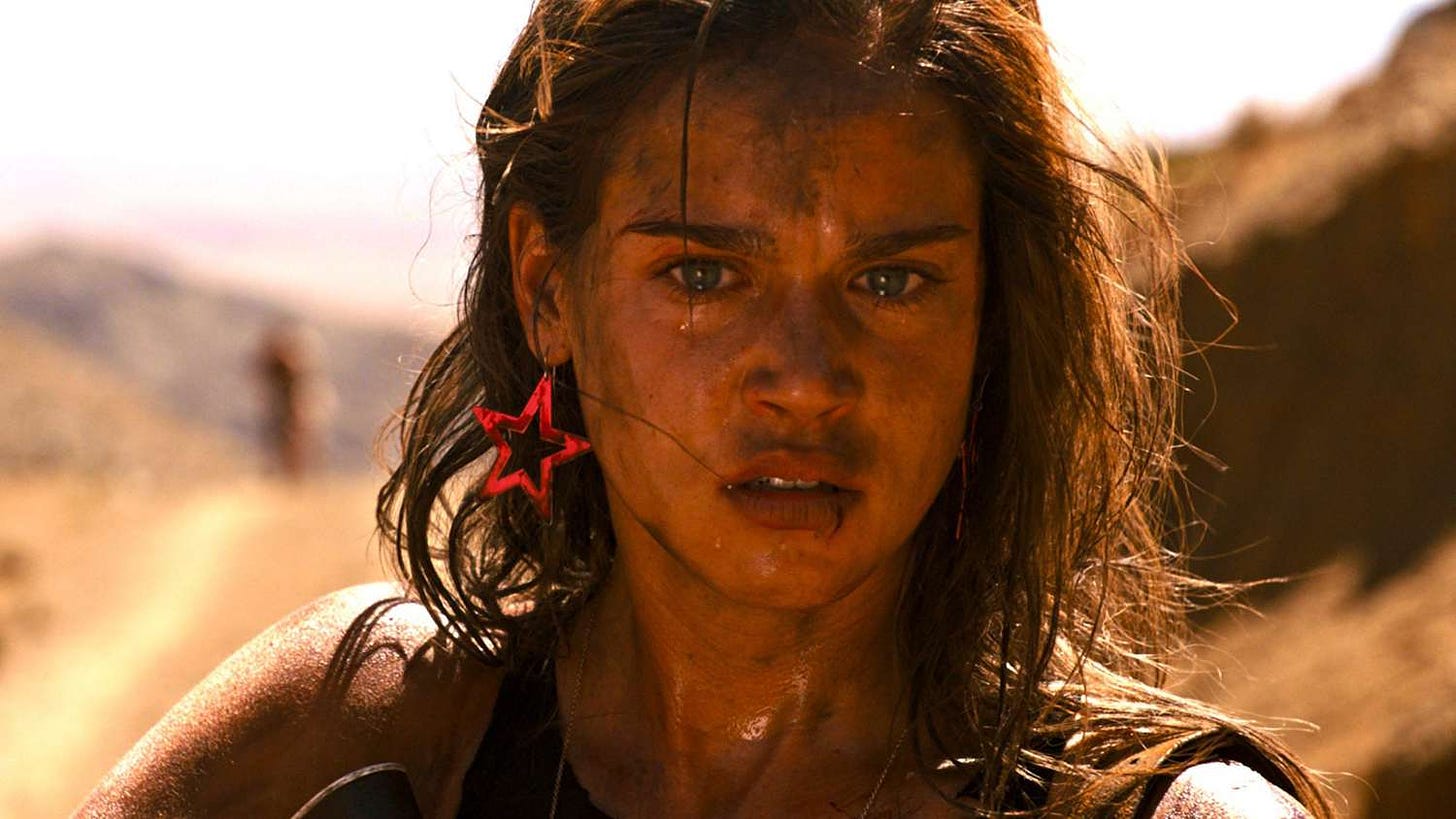The New Cult Canon: 'Revenge'
With her feature debut, French director Coralie Fargeat re-worked the rape-revenge thriller on her own thrillingly stylized terms.
“But you had to put up a fight. Women always have to put up a fucking fight.” — Kevin Janssens as Richard, Revenge
Whew.
That was my reaction when I heard that The Substance*, the second feature by French writer-director Coralie Fargeat, earned a competition spot at last year’s Cannes Film Festival. And I let out a double-whew when Fargeat picked up Best Screenplay at the festival for her juicy-sounding sci-fi/horror premise about an aging aerobics instructor (Demi Moore) who medicates her way to a radical body transformation. My relief has to do with professional reputation: I had picked up the Variety review assignment for Fargeat’s debut feature, Revenge, at the 2017 Toronto Film Festival and hadn’t entirely trusted my own reaction to it. There was no questioning the go-for-broke audacity and zip of Fargeat’s style, but had I talked myself into believing it was more than a gruesome technical exercise? The “exceptionally potent and sure-handed” part seemed self-evident, but the “stylistic tour-de-force that also tweaks sexual politics in meaningful ways” part might have been a stretch. At the bottom of the Variety festival freelance pool, it was always unlikely I’d come across the next big thing.
On second viewing for this column, I’m happy to feel a little validation for my original review, with the caveat that my insecurity stems from the need some critics have to find some high-minded justification for low-down genre kicks. Revenge has the premise of a barebones rape-revenge thriller like I Spit On Your Grave, a film I’d long considered among the most repugnant I’d ever seen, and while the French invite us to vive le différence, Fargeat operates along the razor’s edge. There may be plenty of compelling little details that separate Revenge from other films of its ilk—Fargeat herself has been emphatic in calling attention to her heroine’s transformation—but this is nonetheless the story of a sexy (and sexualized) young woman who survives an assault and takes it out on the three men responsible. That’s pretty cut-and-dried. And Fargeat citing the stripped-down qualities of Steven Spielberg’s Duel only underlines the point.
The Duel comparison also trumpets Revenge’s strengths. Though Spielberg made Duel for television in 1971, it became his de facto feature debut, an experiment and a show-reel for a precocious filmmaker who only needed a tanker truck and a sedan to stage a white-knuckle thriller on a freeway blazing through the Mojave. Revenge heads to the desert, too, for a minimalist/maximalist exercise that gives a seedy horror premise a dazzling amplification. Fargeat has Spielberg’s swaggering confidence that she doesn’t need to finesse the genre basics if she can execute them better than nearly anybody else. Revenge may be too hot for TV, but the effect is the same as Duel: It’s the calculated yet thoroughly gripping opening salvo to a promising career.
Opening with a helicopter touching down on a remote, luxury getaway in the Moroccan desert, Revenge seems like a parody of a rap video or a vintage Michael Bay production, including the introduction of Jen (Matilda Lutz) as a lollipop-nursing sexpot in a short pink skirt with schoolgirl pleats and star earrings to match. Her lover Richard (Kevin Janssens), who owns the place and has the soul of his infinity pool, keeps Jen as a sidepiece while making lovey-dovey phone calls to his wife and kids back home. When Richard’s buddies, Stan (Vincent Colombe) and Dimitri (Guillaume Bouchède), turn up for a hunting weekend, Jen doesn’t expect the company. After Richard leaves her alone in the bedroom the next morning, she rejects Stan’s sexual advances, but he turns aggressive and rapes her as Dimitri shuffles into the living room, turning up the TV to muffle her screams.
For what it’s worth—not much, as it happens—Richard is furious at Stan for raping his girlfriend, but less at the violation than the hassle it’s going to cause him. Though Jen has expressed an interest in moving to L.A., Richard comes to her with an offer to move to Canada (“It’s practically Los Angeles”) and a dollar amount that he intends to transfer into her bank account to buy her silence. He seems to be under no expectation that she will decline, which suggests that Richard has bought his way out of trouble in the past. Plan B for Richard and his buddies is more extreme: The three of them chase Jen to the edge of a cliff and Richard casually shoves her off at a height that would surely have killed her even if she wasn’t also impaled by a dead tree at the bottom. She survives.
The impossibility of Jen’s survival is important, because it marks the point where Revenge departs from reality and turns her into an avenging angel, reborn to put down these men for their sins. Fargeat drives the point home by having Jen chomp into a symbolic apple that grows rotten and mealy as she turns into an Eve of Destruction. (Sometimes you just stumble into a Renée Soutendijk reference and feel great about yourself.) There’s no doubt that Fargeat aims to turn the terrorized Jen into a towering avatar of feminine power, but Revenge isn’t looking to “transcend” the genre in any high-minded way. Though much slicker than an analogous film like Abel Ferrara’s Ms. 45, it’s also an exploitation film through-and-through, bloody and arousing. When Jen literally emerges from a cave with her stomach wound neatly cauterized by a searing beer can—the imprint remains on her skin like a heat-press t-shirt—Fargeat shoots Lutz from the same low-angle she had in the opening. She’s lost none of her erotic charge.
Fargeat’s film literacy is evident through Revenge, which falls squarely within the tradition of the French Extremity movement (shout out to past New Cult Canon entries Irréversible, Trouble Every Day, and Martyrs) while nodding to the shock tactics of Michael Haneke and David Cronenberg. The Cronenberg connection is particularly apt, given Fargeat’s obsession with gashes, bloody viscera, and other grotesque expressions of the body. Rather than linger on Jen’s rape, for example, Fargeat turns instead to Dimitri’s slack-jawed indifference to the scene, which he leers at for a while before masticating on salty snacks like a dumb animal. Later, when a well-placed trap lodges a shard of glass into Stan’s foot and he tries to drive a car, the open wound spurts like a clown’s flower whenever he presses on the brakes. It’s disgusting. And delicious.
All of this is prelude to a showdown between Jen and Richard that turns his sleek bachelor pad into gory Slip ’N Slide where the two fight for their lives as a QVC-like broadcast called Shop Club USA pushes deals on luxury items in the background. Fargeat never misses the opportunity to note the gulf in power and privilege between the two, just as she relishes her own power and privilege as a filmmaker to turn the tables for once. In that sense, Revenge is entirely in keeping with other rape-revenge movies, which are engineered to leave the audience with the feeling that a crude form of justice has been served. The major distinction, in the end, is that Fargeat serves it up with élan. Talent matters that way.
The Substance is due out on September 20th, from Neon.
Next: Yes, I know I keep pushing back Holy Motors. Soon, I swear.







Just nerved myself up to watch this, and wow. Hard to watch, impossible to look away. The initial shot of Jen, past Richard’s shoulder in the back seat of the helicopter, gave me strong LOLITA vibes, which had to be intentional. Fargeat’s eye for color and composition are sharp. There are some beautiful shots here. The tracking shot near the end that takes Richard from the shower, all around the house, and out past the pool and back is incredibly suspenseful. And that final Slip n’ Slide scene — it’s pretty rare that a movie can make me imagine I’m *smelling* the blood, but this one did.
The foot-to-the-pedal blood spurts were the source of much hootin' and hollerin' at the screening I attended when the movie released. Another moment that sticks with me (pun not intended) is Richard using Saran wrap on a shotgun wound in the climax.